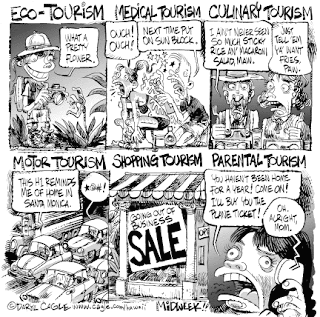
In preparation for my further study I read two books on the subject of tourism. I had already spoke about the first one I read ('Tourism in the age of globalization'), now I'd like to show which are the main points analized in the second one 'Tourism, globalization and development'.
The part that I read from this book was very interesting because it proposes not only the economic side of the touristic industry, but also a moral viewpoint. The author examines the social and environmental impact of tourism in developing and less-developed countries. Many of the poorest countries in the world rely their income on the tourist trade but developers often exclude local communities.
Donaald G. Reid argues on this problematic criticizeing developed countries and he exposes acontrolled plan for an equally development of the touristic sector.
I found very helpfull the intoduction of this book. It gives me the idea on which are the main problematics linked to tourism. Moreover I'm quite sensitive to issues regarding under-developed countries and I hope to delve a bit more into this area.


